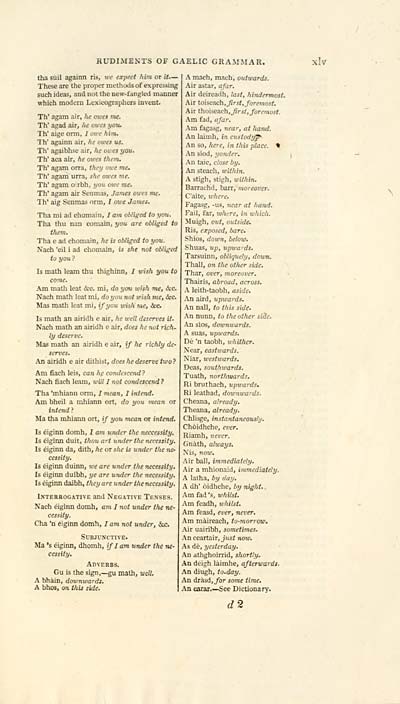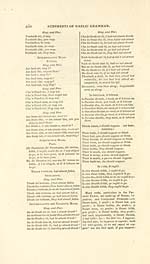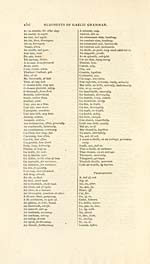Download files
Complete book:
Individual page:
Thumbnail gallery: Grid view | List view

RUDIiMENTS OF GAELIC GRAMMAR.
tha siiil againn ris, ice expect him OT it. —
These are the proper methods of expressing
such ideas, and not the new-fangled manner
which modern Lexicographers invent.
Th' agam air, he owes me.
Th' agad air, he owes you.
Th' aige orm, / owe him.
Th' againn air, he owes us.
Th' agaibhse air, he owes you.
Th' aca air, he otces them.
Th' agam orra, they owe me.
Th' agam urra, she owes me.
Th' agam o:rbh, you otve me.
Th' agam air Senmas, James owes me.
Th' aig Senmas orm, I owe James.
Tha mi ad chomain, / am obliged to you.
Tha thu nan comain, you are obliged to
them.
Tha e ad chomain, he is obliged to you.
Nach 'eil i ad chomain, is she not obliged
to you ?
Is math learn thu thighinn, / wish you to
come.
Am math leat &o. mi, do you wish me, &c
Nach math leat mi, do you not wish me, &c.
Mas math leat mi, if you wish rue, &e.
Is math an airidh e air, he well deserves it.
Nach math an airidh e air, does he not rich-
ly deserve.
Mas math an airidh e air, if he richly de-
serves.
An airidh e air dithist, does he deserve two?
Am fiach leis, can he condescend?
Nach fiach learn, will I not condescend ?
Tha 'mhiann orm, / mean, I intend.
Am bheil a mhiann ort, do you mean or
intend ?
Ma tha mhiann ort, if you mean or intend.
Is Èiginn dorah, I am under the neccessity.
Is eiginn duit, thou art under the necessity.
Is eiginn da, dith, he or she is under the ne-
cessity.
Is eiginn duinn, we are under the necessity.
Is eiginn duibh, ye are under the necessity.
Is eiginn daibh, they are under thenecessity.
Interrogative and Negative Tenses.
Nach eiginn domh, am I not under the ne-
cessity.
Cha "n eiginn domh, / am not under, &c.
Subjunctive.
Ma 's eiginn, dhomh, if I am under the ne-
cessity.
Adverbs.
Gu is the sign,— gu math, well.
A bhain, downwards.
A bhos, on this side.
A mach, mach, outwards.
Air astar, afar.
Air deirearih, last, hindermosi.
Air toiseach.first, foremost.
Air thoiseach,^ri/,/orivnoj<.
Am fad, afar.
Am fagasg, near, at hand.
An laimh, in custody
An so, here, in this place. %
An siod, yonder.
An taic, close by.
An steach, within.
A stigh, stigh, within.
Barrachd, ban, moreover.
C'aite, ichere.
Fagasg, -us, near at hand.
Fail, far, where, in which.
Muigh, out, outside.
Ris, exposed, bare.
Shios, down, below.
Shuas, up, upwards.
Tarsuinn, obliquely, down.
Thai), on the other side.
Thar, over, moreover.
Thairis, abroad, across.
A leith-taobh, aside.
An aird, upwards.
An nail, to this side.
.\n nurm, to the other side.
An slos, downwards.
A suas, upwards.
Dè 'n taobh, whither.
Near, eastwards.
Niar, westwards,
Deas, southwards.
Tuath, northwards,
Ri bnithach, upwards.
Ri leathad, downwards.
Cheana, already.
TTieana, already.
Chlisge, instantaneously.
Chòidhche, ever,
Riamh, never.
Gnath, always.
Xis, now.
Air ball, immediately.
Air a mhionaid, immediately.
A latha, by day.
A dh' òidhche, by night.
Am fad 's, whilst.
Am feadh, whilst.
Am feasd, ever, never.
Am maireach, to-morrow.
Air uairibh, sometimes.
An ceartair, jiisi now.
As dè, yesterday.
An athghoirrid, shortly.
An deigh làimhe, afterwards.
An diugh, to-day.
An dràsd,/cjr some time.
An earar.— See Dictionary.
d2
tha siiil againn ris, ice expect him OT it. —
These are the proper methods of expressing
such ideas, and not the new-fangled manner
which modern Lexicographers invent.
Th' agam air, he owes me.
Th' agad air, he owes you.
Th' aige orm, / owe him.
Th' againn air, he owes us.
Th' agaibhse air, he owes you.
Th' aca air, he otces them.
Th' agam orra, they owe me.
Th' agam urra, she owes me.
Th' agam o:rbh, you otve me.
Th' agam air Senmas, James owes me.
Th' aig Senmas orm, I owe James.
Tha mi ad chomain, / am obliged to you.
Tha thu nan comain, you are obliged to
them.
Tha e ad chomain, he is obliged to you.
Nach 'eil i ad chomain, is she not obliged
to you ?
Is math learn thu thighinn, / wish you to
come.
Am math leat &o. mi, do you wish me, &c
Nach math leat mi, do you not wish me, &c.
Mas math leat mi, if you wish rue, &e.
Is math an airidh e air, he well deserves it.
Nach math an airidh e air, does he not rich-
ly deserve.
Mas math an airidh e air, if he richly de-
serves.
An airidh e air dithist, does he deserve two?
Am fiach leis, can he condescend?
Nach fiach learn, will I not condescend ?
Tha 'mhiann orm, / mean, I intend.
Am bheil a mhiann ort, do you mean or
intend ?
Ma tha mhiann ort, if you mean or intend.
Is Èiginn dorah, I am under the neccessity.
Is eiginn duit, thou art under the necessity.
Is eiginn da, dith, he or she is under the ne-
cessity.
Is eiginn duinn, we are under the necessity.
Is eiginn duibh, ye are under the necessity.
Is eiginn daibh, they are under thenecessity.
Interrogative and Negative Tenses.
Nach eiginn domh, am I not under the ne-
cessity.
Cha "n eiginn domh, / am not under, &c.
Subjunctive.
Ma 's eiginn, dhomh, if I am under the ne-
cessity.
Adverbs.
Gu is the sign,— gu math, well.
A bhain, downwards.
A bhos, on this side.
A mach, mach, outwards.
Air astar, afar.
Air deirearih, last, hindermosi.
Air toiseach.first, foremost.
Air thoiseach,^ri/,/orivnoj<.
Am fad, afar.
Am fagasg, near, at hand.
An laimh, in custody
An so, here, in this place. %
An siod, yonder.
An taic, close by.
An steach, within.
A stigh, stigh, within.
Barrachd, ban, moreover.
C'aite, ichere.
Fagasg, -us, near at hand.
Fail, far, where, in which.
Muigh, out, outside.
Ris, exposed, bare.
Shios, down, below.
Shuas, up, upwards.
Tarsuinn, obliquely, down.
Thai), on the other side.
Thar, over, moreover.
Thairis, abroad, across.
A leith-taobh, aside.
An aird, upwards.
An nail, to this side.
.\n nurm, to the other side.
An slos, downwards.
A suas, upwards.
Dè 'n taobh, whither.
Near, eastwards.
Niar, westwards,
Deas, southwards.
Tuath, northwards,
Ri bnithach, upwards.
Ri leathad, downwards.
Cheana, already.
TTieana, already.
Chlisge, instantaneously.
Chòidhche, ever,
Riamh, never.
Gnath, always.
Xis, now.
Air ball, immediately.
Air a mhionaid, immediately.
A latha, by day.
A dh' òidhche, by night.
Am fad 's, whilst.
Am feadh, whilst.
Am feasd, ever, never.
Am maireach, to-morrow.
Air uairibh, sometimes.
An ceartair, jiisi now.
As dè, yesterday.
An athghoirrid, shortly.
An deigh làimhe, afterwards.
An diugh, to-day.
An dràsd,/cjr some time.
An earar.— See Dictionary.
d2
Set display mode to: Large image | Transcription
Images and transcriptions on this page, including medium image downloads, may be used under the Creative Commons Attribution 4.0 International Licence unless otherwise stated. ![]()
| Early Gaelic Book Collections > Blair Collection > Argyleshire pronouncing Gaelic dictionary > (49) |
|---|
| Permanent URL | https://digital.nls.uk/76240445 |
|---|
| Description | A selection of books from a collection of more than 500 titles, mostly on religious and literary topics. Also includes some material dealing with other Celtic languages and societies. Collection created towards the end of the 19th century by Lady Evelyn Stewart Murray. |
|---|
| Description | Selected items from five 'Special and Named Printed Collections'. Includes books in Gaelic and other Celtic languages, works about the Gaels, their languages, literature, culture and history. |
|---|

